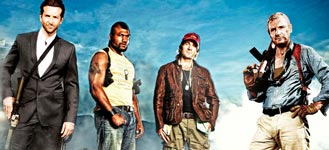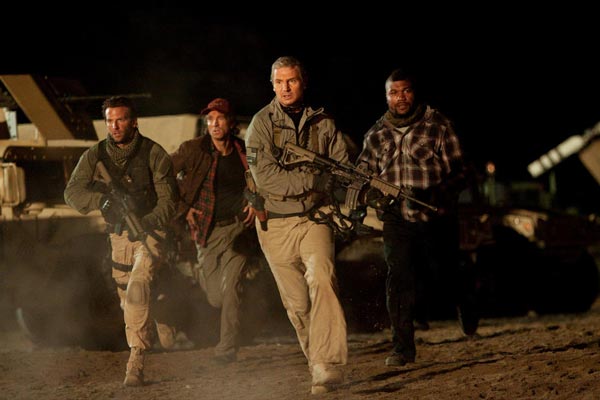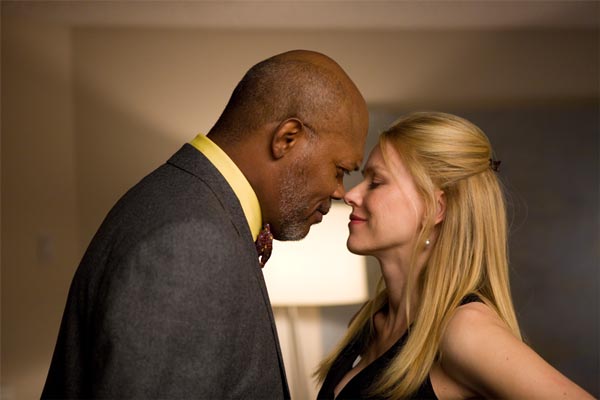The A-Team (20th Century Fox)
Whipped, nipped, and tucked into submission, The A-Team is an expensive-looking, high-gloss action bonanza, so calculative as to feel mechanical, and so unobtrusive or unchallenging in any way that it’s almost spooky.
Four renegade army types team up for militaristic operations under the US Army’s banner that no sane person would even dream of, let alone attempt. Their leader, the brains of the group, is Hannibal, played by a strong and centered Liam Neeson, who proves an apt line-reader but lacks a certain wily disregard. The brawns is B.A. Baracus, famously played by the fool-pitying Mr. T in the original television series, and here portrayed by Quinton ‘Rampage’ Jackson with the proper heft and haircut but little of the brazen vigor.
Bradley Cooper is the pretty-boy/party-boy Face, whose daredevil nerve would likely be a better fit for the “Jackass” clan than any super-squad. And finally, there’s Murdock, the only member of the A-Team whose actions match his persona (he’s categorically insane—even though they’re all some measure of insane). Sharlto Copley, impressive in his debut in District 9 last year, gives Murdock outrageous lift, providing a bridge into the realm of the impossible—a realm visited not so infrequently by the film.
In order for The A-Team to succeed, as a group and as a narrative, basic human intellect, statistical probability, and the laws of physics all must make way. The team’s stunts repeatedly require incompetence on the part of its opponents, and for every piece of every plan, including those outside of the team’s control, to fall perfectly into place.
Of course, it all works out for the A-Team, and we’re not supposed to question it—nor are we supposed to question how a helicopter could operate upside-down, or how a tank, plummeting from the sky at near-terminal velocity, could cause little-to-no damage upon final impact.
The film opens with a somewhat rambling prologue introducing us to the A-Team, and the members of the team to each other. It’s a well-shot, well-staged sequence (except for one major blunder—the biggest in the film—when a fence appears to collapse just before two human projectiles are thrown into it), but it lacks fire, spunk, attitude. And these qualities persist: nicely constructed, but too paint-by-the-numbers—as if the A-Team had its edges dulled.
Not that these guys are a soft or sensitive bunch, either; what they lack in bite, they surely don’t make up for in self-reflection. That’s what’s missing here: when the members of the A-Team find themselves double-crossed (something we’re not supposed to see coming—but we do), they react in complete disbelief, as if this is the moment that incomprehensively defies Newtonian principle. With a little less cheesy banter and a little more introspection, such an error—and certainly such an existential breakdown—could have likely been averted.
What the film does assert is even more contemptible: that Jessica Biel’s increasingly plunging neckline provides a valid female perspective, that prodigious CGI effects are comparable to sleight-of-hand thrills, that violence is indeed the answer—the best and only answer, even—so long as the target is deserving (a view that is bafflingly attributed to Gandhi, of all people… OF ALL PEOPLE!).
In the end, a plot too nonsensical and irrelevant to describe here draws to a clumsy close, and the film winks at us, insisting that what just occurred was somehow more than a periodically exciting though entirely vacuous excursion—that “clever” and “wise” were there in disguise. We’re supposed to be dumb like disposable henchmen; we’re not supposed to question it.
Then the A-Team is back on the lam, and a comic-book montage depicts the gang as private agents—setting up the premise of the original TV series and teeing up, no doubt, for a new film franchise. And we realize that we’ve really been watching a prologue the entire time: yet another movie prequel. Another prequel. Ugh.

Directed by Joe Carnahan. Written by Joe Carnahan & Brian Bloom, and Skip Woods, based on the television series “The A-Team” created by Frank Lupo and Stephen J. Cannell.
Rated PG-13 for intense sequences of action and violence throughout, language and smoking.
Runtime is 1 hour, 57 minutes.
Tickets & Showtimes» Watch the Trailer» Visit the Website»
Mother and Child (Sony Classics)
» Read my interview with writer/director Rodrigo Garcia!
What is a family? Is it a group of people who share DNA—a mother, a father, and resulting progeny? Or is it more abstract: comprised of individuals, not necessarily related by blood, who share time together—who share life together? Is it a concept that can even be defined?
These questions lie at the heart of Mother and Child, and the answers are beautifully explored by a stellar cast in the delicate hands of writer and director Rodrigo Garcia. The film dutifully portrays the many facets of family, motherhood, human relationships, and adoption; though reading its narrative as some ideological construct misses the point entirely.
This is the story of three women, all heavily scorned by fate, learning to live and learning to love. Annette Bening plays Karen, a woman who, at the age of 14, was forced to give up her newborn daughter for adoption. Though Karen is now hardened and middle-aged, not a single day passes that she does not feel immense regret. A longing, a despair, pervades and poisons the air around her. As it does for Karen’s relinquished daughter, now an adult and high-powered attorney named Elizabeth (Naomi Watts, giving her best performance since her staggering breakthrough in David Lynch’s Mulholland Drive).
As Karen and Elizabeth shoulder through the continuing aftershocks of a disrupted relationship, Lucy (Kerry Washington) wants to start a family of her own. Because she is unable to conceive, she and her husband Joseph (David Ramsey) turn to adoption—the very process that proved so devastating to both Karen and Elizabeth.
That the paths of these three women will eventually cross is not supposed to be a surprise: it feels inherent, written in the stars—like three moonlit satellites circling and converging on the same locus. The constant sense of an impending collision imbues the film with a remarkable immediacy.
Rodrigo Garcia has a knack for writing natural dialogue—I found no more than three spoken lines to feel even somewhat insincere—but he’s also not afraid to use dramatic rhythms. His words are true, but they’re also heavy, consequential, absorbing; he places everyday discourse into a cinematic context. Some may find his style to be overly theatrical, but it’s because of the extra weight that we care for his creation, and for his characters. (If I wanted an exact reflection of reality, I’d watch a documentary.)
Karen and Elizabeth, sour and scornful, even cruel and manipulative, should be entirely repelling characters. But thanks to top-notch acting and sensitive writing, we understand that theirs are damaged souls. We feel empathy—not disgust. Their intensity, even in their solace, is gripping. Though Ms. Washington seems slightly less secure as Lucy, her interactions with the biological carrier of her baby-to-be (played by Shareeka Epps) prove just as fascinating—like a student sent to the principal’s office, and Lucy is not the one in charge.
It’s through these smaller moments—exchanges between people, glances, pauses, expressions, reactions, and interactions—that the film mines its dramatic power. Garcia proves that while explosions, figurative in this case, can be thrilling, it’s the fallout—the emotions, the consequences, the reactions—that are richer, more prodding, more affecting. But he also doesn’t hesitate to stun or surprise.
My only quibble with the film involves its depiction and use of men. Karen befriends a coworker named Paco (Jimmy Smits), who helps her, with his mere presence, to love again. Samuel L. Jackson is also on hand, in a rare sensitive turn, as Elizabeth’s boss Paul; he stands his ground even as Elizabeth pushes him away. Though Paco and Paul are certainly characters in their own right, they may just be too kind, or at least improbably uncomplicated—especially next to the dynamic illustrations of their fellow sex (even Lucy’s husband Joseph is given little opportunity to speak his mind).
Our three central characters indeed intersect, and their lives change accordingly—greatly in some aspects, subtly in others, and either way, monumentally in feeling. And Mother and Child concludes with a beautiful, touching depiction of a family—borne of both shared time and bloodlines, but wonderfully indefinable.

Written and directed by Rodrigo Garcia.
Rated R for sexuality, brief nudity, and language.
Runtime is 2 hours, 5 minutes.
Tickets & Showtimes» Watch the Trailer» Visit the Website»








Well apparently you never saw the A- Team series. It was not supposed to be a mind boggler. Every episode was exactly the same, guns were always being fired, yet no one ever died, not to mention it starred Mr. T. It was always good entertaining popcorn fun, that was more dialog driven than plot driven. Obviously you thought you were getting some sort of “Bourne/Taken” crossover movie when you went and watched this. Its isn’t supposed to be that believable. Its supposed to be campy action/humor. Its a summer action movie that is character and action driven, not plot driven. You need to get over yourself as a movie critic, and maybe actually appreciate or pay attention to what you are watching, that way your intelligence won’t be offended. Did you not notice that this film starred a man named “Rampage”?, don’t blame the film for being more “Die Hard”, than “Heat” because that’s exactly how it advertised itself, and I love it for that reason.
Umm…gotta agree with BPB. The movie sounds just like the old show with a bigger budget. I haven’t seen it yet (though I probably will this coming weekend), but from everything I’ve read and heard it’s a very entertaining movie and the only people I’ve seen complaining about it are reviewers who take themselves way to seriously and can’t seem to just go enjoy a movie that doesn’t pretend to be anything other than a bunch of explosions and actions scenes loosely tied together with a thin plot. It’s not trying to win any awards and no one ever pretended that an “A-Team” should be an Oscar contender.
Reviewers gushed all over the crap that was “The Aviator” and it won Best Picture and I’ve never been more bored out of my mind in a movie theater. If I’m spending my hard earned money on a movie it better be entertaining.